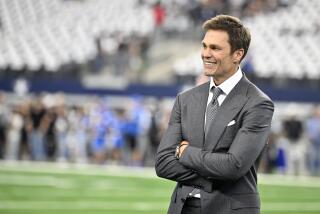Testimony Serves Both Sides in Raider Suit
- Share via
With 11 NFL owners absent from league meetings in Palm Desert, some apparently not wanting to risk being served with a subpoena in the Raiders’ $1-billion lawsuit against the NFL, former league president Neil Austrian said Monday he hadn’t given a thought to not testifying.
Austrian, who retired at the end of 1999, after eight years as league president, lives in Colorado--meaning, for the purposes of a civil lawsuit such as the Raiders’ case, he would be out of the reach of a California subpoena demanding his attendance as a witness.
Monday was Austrian’s third day on the stand. League attorney Allen Ruby asked him, “Why are you here?”
Because, Austrian answered, “I think it was the right thing to do.”
Austrian also offered a wide range of testimony Monday on the complicated issues in the case--testimony that served both sides.
The case centers on the Raiders’ claim that the NFL interfered with the team’s deal to build a $250-million stadium at Hollywood Park in 1995, leaving owner Al Davis no option but to return to Oakland. The Raiders played in L.A. from 1982 through 1994 and claim they still own the market for NFL football.
The team is seeking more than $1 billion in damages. The league denies wrongdoing.
With Ruby doing the questioning Monday, Austrian testified that the league had offered to make available to the team a total of 18,000 tickets for a first Super Bowl at the proposed Hollywood Park site. That could have meant $27-$36 million in promotional and sponsorship opportunities to the Raiders, Austrian said, adding that the league had “never made before” that commitment to any other team.
A key theme of the league’s defense is that not only did it not interfere with the Hollywood Park deal but worked hard to make it happen.
Earlier, with Raider attorney Joseph Alioto asking the questions, Austrian testified about league-produced financial statements showing the Raiders’ revenue sliding downward since the team’s return to Oakland.
In 1995, the Raiders ranked eighth in the league in revenue, Austrian testified. In 1996, they were 12th, then 19th in 1997, 26th in 1998 and 28th in 1999. The Raiders had been 23rd in 1994, their last season in Los Angeles.
The Hollywood Park deal would have catapulted the Raiders to No. 2 in the league, with revenues approaching $99 million in 1997 and “commensurate profitability,” according to a 1995 memo Austrian wrote to the league’s finance committee.
The Raiders contend that the prospect of their being so financially successful was a threat to other owners--who then, the team claims, worked to blunt the deal.
More to Read
Go beyond the scoreboard
Get the latest on L.A.'s teams in the daily Sports Report newsletter.
You may occasionally receive promotional content from the Los Angeles Times.










